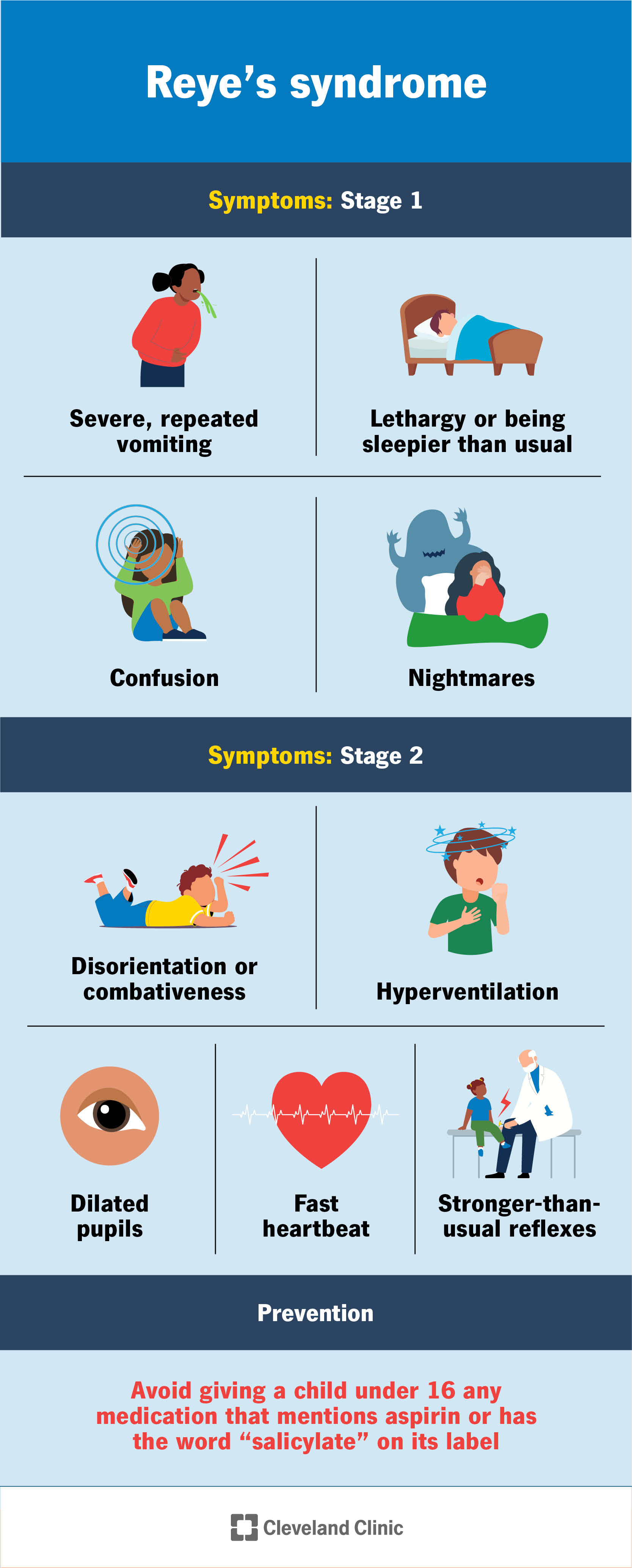Reye’s syndrome is a rare childhood illness that can affect children who receive aspirin (salicylate) to treat a viral illness like the flu or chickenpox. Reye’s syndrome causes brain damage because their livers stop filtering toxic ammonia out of their blood. To prevent it, don’t give aspirin or aspirin-containing products to children under 16.
Advertisement
Cleveland Clinic is a non-profit academic medical center. Advertising on our site helps support our mission. We do not endorse non-Cleveland Clinic products or services. Policy
Reye’s syndrome is a rare childhood condition that makes your brain swell. It happens when your liver can’t filter ammonia out of your blood. It’s most common among children who take aspirin for a viral infection or illness. The condition usually develops within a week after the onset of a viral illness but can happen anywhere between 12 hours and three weeks after one.
Advertisement
Cleveland Clinic is a non-profit academic medical center. Advertising on our site helps support our mission. We do not endorse non-Cleveland Clinic products or services. Policy
Today, in the U.S., there are only a handful of Reye’s syndrome cases each year. But it’s still a serious condition. Experts estimate that it’s fatal in up to 2 out of 5 cases.

Image content: This image is available to view online.
View image online (https://my.clevelandclinic.org/-/scassets/images/org/health/articles/6088-reyes-syndrome.jpg)
Reye’s syndrome symptoms happen in five stages.
Stage 1 symptoms:
Stage 2 symptoms:
Stage 3 symptoms:
Stage 4 symptoms:
Stage 5 symptoms:
Experts don’t fully understand how or why Reye’s syndrome happens. Research previously linked it to children taking aspirin because of viral infections, like the flu or chickenpox. But newer research suggests that aspirin and viral illnesses might not be the only factors.
Another key factor could be undiagnosed inborn errors of metabolism (IEM) that affect mitochondria in your liver cells. Mitochondria are the powerhouses of your cells, like engines that burn fuel to work. But having an IEM can make it harder for liver cells to process a drug like aspirin. That, plus the added strain of a viral illness, might cause your liver to stop working properly.
Advertisement
One of your liver’s key jobs is to filter ammonia out of your blood. If it builds up in your blood, that’s called hyperammonemia. Disruptions in your liver can make it harder for your blood to clot, too.
Ammonia is extremely toxic to your brain, causing hepatic encephalopathy. That makes your brain swell (cerebral edema). But there isn’t a lot of extra room inside your skull, so the pressure from the swelling damages your brain.
Healthcare providers can diagnose Reye’s syndrome using a combination of methods. They’ll start by asking you about your child’s recent illnesses or symptoms. They’ll also do physical and neurological exams.
Lab tests are also an essential part of diagnosing Reye’s syndrome. The likely tests include:
There’s no direct treatment for Reye’s syndrome. Healthcare providers will try to manage the effects and symptoms so they don’t cause serious or permanent damage. Some treatments they’ll use include:
The recovery time for Reye’s syndrome can take days or weeks. It varies depending on many factors. Your child’s healthcare provider is the best one to ask for more information. They can tailor the information to the specifics of your child’s case.
The outlook for Reye’s syndrome is best with early diagnosis and treatment. If your child is given or takes aspirin, call their pediatrician right away. And if your child has taken aspirin and starts showing the early symptoms of Reye’s syndrome, they need immediate care. Call 911 (or your local emergency services number) or take them to the nearest hospital right away.
Reye’s syndrome can cause complications, especially when it’s severe. Some of these can be long-term or permanent effects. The possible complications include:
Yes, Reye’s syndrome is preventable. The most effective way to prevent it is to not give children aspirin unless their pediatrician or healthcare provider recommends it.
One key thing to know is that many over-the-counter medications include aspirin as an ingredient. That means it’s critical that you read medication labels.
Advertisement
If you have questions about what to give your child, ask their pediatrician. They can recommend products that are effective and safe for your child to take.
Some conditions, like Kawasaki disease, still have aspirin as a key part of their treatment. If your child has Kawasaki disease, their pediatrician will take extra steps to catch and treat Reye’s syndrome early.
When your child doesn’t feel well, nobody could blame you for wanting to make them feel better. One key way to avoid an even more serious illness, Reye’s syndrome, is to not give them anything containing aspirin. Make sure you read medication labels for their ingredients. And if you have any questions about what to give your child, don’t hesitate to ask their pediatrician or a pharmacist. They can help you make sense of the labels and find remedies that won’t put your child at risk of Reye’s syndrome.
Advertisement

Sign up for our Health Essentials emails for expert guidance on nutrition, fitness, sleep, skin care and more.
Learn more about the Health Library and our editorial process.
Cleveland Clinic’s health articles are based on evidence-backed information and review by medical professionals to ensure accuracy, reliability and up-to-date clinical standards.
Cleveland Clinic’s health articles are based on evidence-backed information and review by medical professionals to ensure accuracy, reliability and up-to-date clinical standards.
Whether you need stitches, a broken bone set or think your appendix might be causing your abdominal pain, Cleveland Clinic’s emergency medicine team is here to help.
